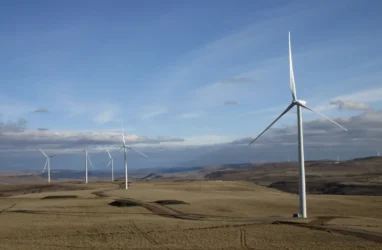
Fossil fuel activist investor Elliott Investment Management is keeping up the pressure on fossil fuel producers and utility giants around the world to wind back their focus on renewables and double down on oil, gas and coal – despite the catastrophic effects of climate change. On Monday the hedge fund used its financial position in German utility RWE AG to pressure the company to back off an ambitious multi-billion-euro investment program in renewable energy in order to expand a share buyback scheme. RWE, the second largest-developer of offshore wind farms, announced it would slash its investment programme by €10 billion ($A17 billion), citing the uncertainty created by Donald Trump’s actions in the US.
RWE has multiple projects in the US going through the early stages of development and said it was “impossible to predict” the future of renewable energy in the country. The German utility is also a significant player in renewable energy projects across Australia. It owns and operates the 249 MW Limondale solar farm in New South Wales, where it is also building the country’s first .

It has and plans to build at least 3GW of renewable energy capacity by 2030. Last year the company secured its off the Gippsland coast. Elliot, which holds a 5% stake in RWE, welcomed the company’s decision but said it was “disappointed” by the lack of clarity “regarding the Company’s commitment to enhance shareholder returns”.
“Given the announced capex reduction and RWE’s persistent undervaluation, we believe there is a compelling opportunity to significantly increase and accelerate the ongoing share buyback programme,” it said. Similar comments have been made by Morningstar and Enkraft, the latter of which has been a long-time critic of the company. Share buyback schemes are used by firms to redirect pure returns directly to shareholders and release them to reinvest that money elsewhere.
Will van de Pol, CEO of Market Forces said that in recent years climate-conscious shareholder activists and civil society groups have been pushing for fossil fuel companies to embrace share buyback programs to free up capital for reinvestment in green energy projects. “It’s just being used in the opposition direction in this case,” he said. The news follows a separate string of meetings between Elliot and fellow BP shareholders over the weekend, where Reuters the firm was seeking a united front to force deeper changes at the company even after it abandoned its pivot to renewable energy last month.
Elliot, which holds a near 5% stake in BP, its renewable energy assets to return to focusing on oil and gas extraction. Though the climate movement and climate-conscious investors were sceptical of the company’s “Beyond Petroleum” rebrand, the event was widely read as signalling a broader change in the political landscape following the re-election of Donald Trump. Elliott Management appears to have embraced the shift with the Financial Times that staff working with the firm’s energy team turned up to work following BP’s pivot last month wearing t-shirts with “Gulf of America” printed on them.
One included a picture of Donald Trump as a pirate. Despite what appears to be a reaction among some sectors of the financial world, Australian iron ore billionaire Andrew Forrest has doubled down on renewables he planned to continue with a plan to stop burning fossil fuels across all his operations by the end of the decade. “I’ve always found that the customer is always right, which is why we’re going renewable and moving away from oil and gas because our customers are saying, ‘we want energy but not at any cost, and if you can give us green energy at the same price as dirty [energy] then we are going to buy green every day.
’ That’s my job, and that’s Fortescue’s job,” Forrest said. Though van de Pol says there is “a bit of a pendulum swing going on”, it’s not clear yet whether a broader trend of pushback by dark activist investors like Elliot has materialised. “The transition is underway and the pure economics of producing energy from renewable sources versus fossil fuels will continue to drive that transition but we can’t allow for it to be delayed by short term opportunistic actions and investment decisions,” he said.
“What’s at stake is the effort required to meet global climate goals and avoid the worst climate impacts.”.















